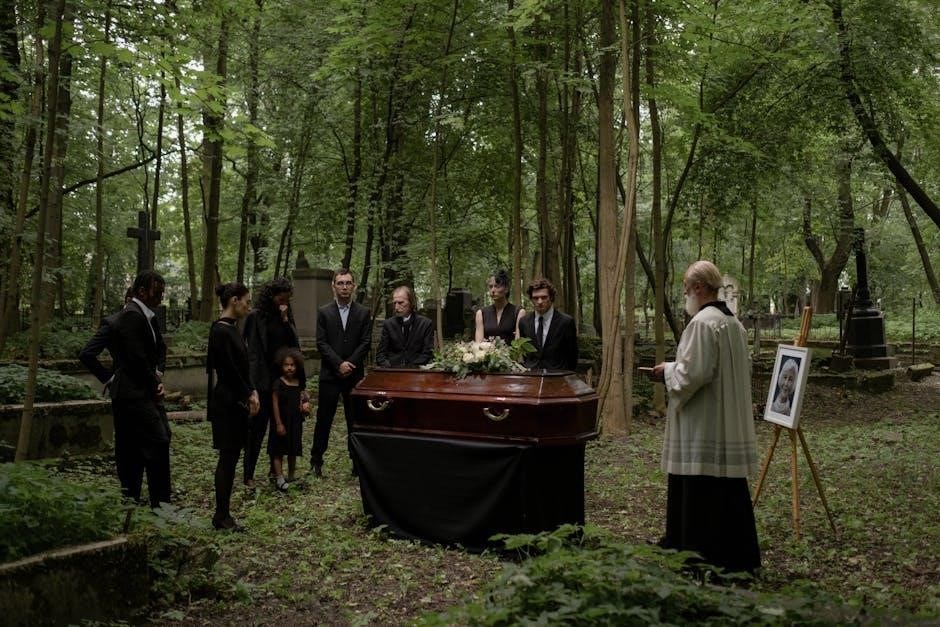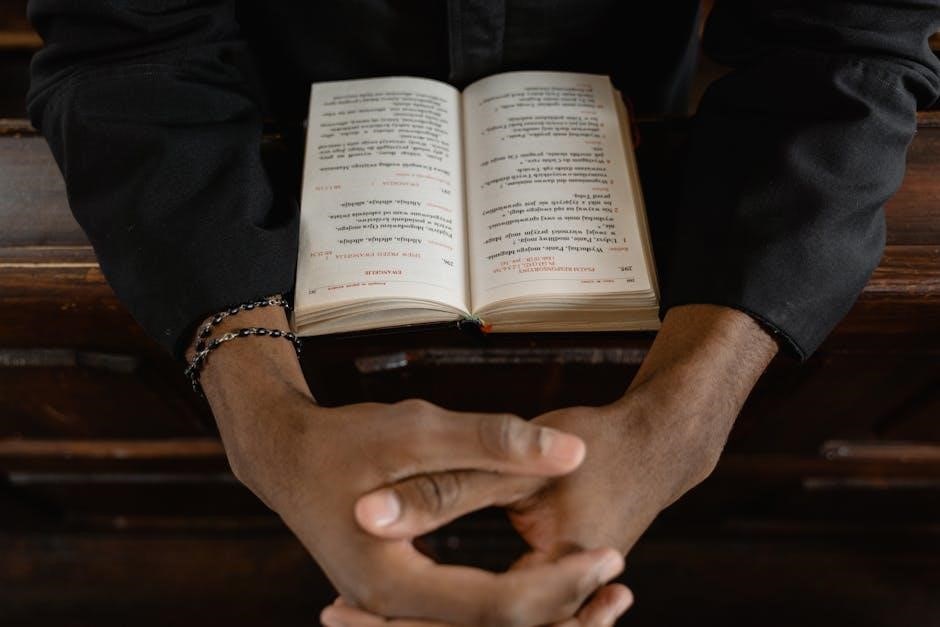The role of a priest is deeply rooted in spiritual leadership, serving as teachers of faith, ministers of sacraments, and spiritual leaders in the community. Priests are called to guide, nurture, and represent God’s presence, embodying divine love and care for humanity.
1.1 The Spiritual and Ministerial Nature of Priesthood
The priesthood is a sacred vocation rooted in spiritual and ministerial duties, where priests serve as intermediaries between God and humanity. As representatives of God, priests are called to embody divine love, compassion, and wisdom. Their role involves guiding believers on their spiritual journey, offering sacramental grace, and fostering a deeper connection with the divine. The ministerial aspect of priesthood emphasizes service, teaching, and pastoral care, ensuring the spiritual well-being of the congregation. Priests are also expected to uphold personal sanctity, reflecting God’s holiness in their lives and actions. This dual focus on spirituality and ministry defines the essence of priesthood, making it a life of devotion and selfless service.
1.2 Historical Significance of the Priestly Ministry
The priestly ministry holds profound historical significance, tracing its roots to ancient religious traditions where priests served as mediators between the divine and humanity. As spiritual leaders, priests have historically been entrusted with preserving sacred teachings, performing rituals, and guiding communities in moral and spiritual matters. From ancient times, the priesthood has symbolized a sacred vocation, with priests representing God’s presence among people. This role has evolved over centuries, yet its core essence remains unchanged. The historical legacy of priesthood is marked by its contributions to shaping cultures, fostering faith, and providing spiritual nourishment. It continues to be a cornerstone of religious life, reflecting timeless values of service, devotion, and divine connection.
Key Responsibilities of a Priest
Priests provide spiritual leadership, guide communities in faith, and support individuals through teaching, sacraments, and pastoral care, fulfilling their divine and communal duties.
2.1 Teaching and Preaching the Word of God
The priest’s primary duty is to proclaim the Gospel, teaching and preaching the Word of God to guide believers in living according to divine truth. Through sermons, Bible studies, and personal guidance, priests help followers understand scripture and apply its teachings to their lives. This role involves making sacred texts relatable and relevant, ensuring the message of faith resonates with diverse audiences. Priests also serve as spiritual educators, fostering a deeper understanding of God’s will and fostering a community rooted in faith. Their teachings aim to inspire spiritual growth, moral integrity, and a commitment to living as disciples of Christ.
2.2 Administering Sacraments and Spiritual Guidance
Priests play a vital role in administering sacraments, which are essential for spiritual growth and divine grace. From baptisms to the Eucharist, these sacred rites connect believers to God. Priests also provide spiritual guidance, offering counseling and advice to help individuals navigate life’s challenges. Through confession and absolution, they facilitate reconciliation with God, fostering healing and renewal. Their ministry ensures that the faithful receive the spiritual nourishment needed to live a life aligned with divine will. By administering these sacraments and offering guidance, priests serve as mediators of God’s grace, helping parishioners deepen their faith and walk in harmony with Christ’s teachings.
2.3 Leadership in the Christian Community
Priests are called to provide spiritual and moral leadership within their communities, guiding believers in living according to God’s will. They inspire and direct the congregation in making decisions that align with Christian values. By fostering unity and collaboration, priests help build a cohesive and compassionate community. Their role involves setting a moral and spiritual example, encouraging active participation in worship, and promoting service to others. Through their leadership, priests help the community grow in faith and work together toward common goals. This leadership is not only about guidance but also about empowering parishioners to live as disciples of Christ, reflecting God’s love in their lives and actions.

The Spiritual Dimensions of Priesthood
Priests embody a divine calling, serving as spiritual intermediaries and living examples of holiness, guiding others through their sacred duties and personal devotion to God.
3.1 The Priest as a Representative of God
The priest serves as a sacred bridge between God and humanity, embodying divine authority and love. As a representative of God, the priest is entrusted with teaching, guiding, and sanctifying the faithful. Their role is to reflect God’s mercy, justice, and compassion, ensuring His presence is felt in the community. Priests are called to act in persona Christi, modeling their lives after Jesus’ teachings and sacrifices. This sacred duty demands profound spiritual integrity, as they are not only servants but also living symbols of God’s grace and redemption. By representing God, priests fulfill a divine mandate to lead others toward salvation and eternal life.
3.2 The Importance of Personal Sanctity and Holiness
Personal sanctity and holiness are cornerstone virtues for a priest, as their life must reflect God’s divine presence. A priest’s spiritual integrity directly impacts their ability to inspire and guide others. Prayer, self-reflection, and adherence to moral principles are essential practices that foster holiness. By living a life of virtue, priests embody Christ’s teachings, making their ministry credible and transformative. Their personal sanctity not only strengthens their spiritual authority but also serves as a beacon of hope and faith for the community. A holy priest becomes an effective instrument of God’s grace, enabling others to draw closer to Him and embrace a life of faith and devotion.

The Priest’s Role in the Modern Church
In the modern church, priests guide faith communities, embrace contemporary challenges, and provide pastoral care. They collaborate with lay leaders to foster inclusive, vibrant, and spiritually nourished congregations.
4.1 Pastoral Care and Supporting Parishioners

Priests play a vital role in providing pastoral care, ensuring the spiritual and emotional well-being of their parishioners. This includes visiting the sick, counseling individuals, and offering guidance through life’s challenges. By fostering a sense of community, priests help create an environment where believers feel supported and valued. Their role extends to empowering individuals to deepen their faith and navigate life’s difficulties with grace. Through empathy and compassion, priests serve as spiritual shepherds, enabling parishioners to grow in their relationship with God and find meaning in their lives. This ministry of care is central to the priest’s mission, reflecting Christ’s love and concern for all people.
4.2 Collaborating with Other Clergy and Lay Leaders
Priests work closely with other clergy and lay leaders to ensure the effective functioning of the church community. This collaboration involves sharing responsibilities, discussing pastoral strategies, and making decisions that benefit the parish. By partnering with bishops, deacons, and lay ministers, priests foster a sense of unity and shared mission. Such teamwork enables the church to address the diverse needs of its members more effectively. Open communication and mutual respect are key to successful collaboration, ensuring that all initiatives align with the church’s teachings and goals. This cooperative approach strengthens the church’s ability to serve and inspire its congregation, reflecting the priesthood’s commitment to collective ministry and service.
Challenges and Opportunities in Priesthood

The priesthood faces challenges like balancing spiritual and administrative duties, while opportunities arise in adapting to modern societal changes and deepening personal sanctity for effective ministry.
5.1 Balancing Spiritual and Administrative Duties
Priests often face the challenge of balancing their spiritual responsibilities with administrative tasks. While their primary role is to nurture the spiritual growth of their congregation, they must also manage the practical aspects of running a parish. This includes overseeing finances, maintaining facilities, and organizing events. Time management becomes crucial, as they strive to dedicate equal attention to both realms. The internet resources emphasize that priests must remain rooted in their spiritual calling, ensuring that administrative duties do not overshadow their role as teachers and ministers of the Word. By prioritizing their divine mission, priests can effectively serve their community while maintaining their sacred vocation.
5.2 Adapting to Contemporary Social and Cultural Changes
Priests must navigate the evolving social and cultural landscape while remaining faithful to their spiritual mission. The internet highlights the need for priests to engage with modern issues, such as social justice and technological advancements, to stay relevant. They are encouraged to use digital platforms for outreach and to address contemporary concerns like mental health and societal inequalities. Additionally, priests must adapt to cultural diversity, respecting varied traditions while maintaining the integrity of their teachings. This requires a delicate balance between preserving tradition and embracing innovation. By doing so, priests can effectively guide their communities through the complexities of the modern world, fostering spiritual growth and unity.
